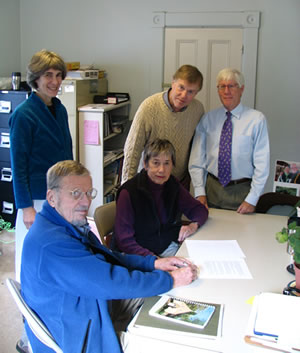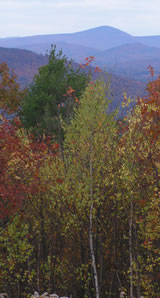How Do I Conserve My Land?
 |
PLC Executive Director Margaret Watkins, President John McCausland and Attorney Jed Callen look on as The Right Rev. Arthur & Roberta Walmsley complete a conservation easement on their property in Deering. |
How do I Conserve my Land?
PLC employs two primary methods of land conservation. If the landowner wishes to retain ownership of the land a conservation easement can be used. If not, land may be gifted to the PLC for conservation use and management. In either circumstance, gifts of land or easements may be made during the landowner’s lifetime or through a will.
What is a Conservation Easement?
A conservation easement provides permanent protection for land in an undeveloped state. The purpose of a conservation easement is to prevent activities from occurring on the property that would impair the land’s scenic, ecological, and other natural resource or recreational values. An easement does not change property ownership. Both public and private lands can be protected by conservation easements.
Each easement is designed with the specific landowner and property in mind. A conservation easement typically allows for forestry and agricultural uses, wildlife habitat protection and enhancement, maintenance of scenic views, and watershed protection. It may provide for public access and recreational or educational uses if the landowner so desires.
An easement is a legal agreement between the landowner and a conservation organization, a municipality, or the state. The document is recorded in the registry of deeds and is permanently binding on future owners. Generally, the landowner donates an easement to the recipient organization; occasionally the organization buys an easement from the landowner.
Why Would a Landowner Want to Donate an Easement?
Many landowners want to know that their land will remain undeveloped long after control has passed from their hands. Easements insure that the land will remain as open space.
An easement may also provide a landowner immediate and long-term financial benefits. In New Hampshire, land under conservation easement is taxed at no more than its current use value for property tax purposes. The value of an easement is considered a charitable gift for federal income tax purposes and may offer the donor substantial tax savings for up to six years. Because an easement reduces the value of a property by eliminating its development potential, the federal and New Hampshire estate taxes levied when the owner dies may be reduced from what they would be were there no easement. Historically, easements have helped heirs retain family lands intact, without their being forced to sell off part or all of the land in order to pay the inheritance taxes.
What Does a Conservation Easement Do to the Landowner’s Use of the Land?
Although its uses are restricted by the terms of an easement, the land under easement remains privately owned, and the owner can do anything that does not violate the purposes and terms of the easement. A conservation easement typically prohibits new residential, commercial, and industrial development, mining, changes to the topography, and destruction of important plant or animal habitats. Most easements allow for structures and alterations necessary for farming or forestry. Easements may also be written to allow for one or more new house sites on the property at a future date.
What Does a Conservation Easement Mean for the Grantee?
New Hampshire RSA 447:45-47 allows qualified private, nonprofit conservation organizations and government agencies to accept and enforce the terms of conservation easements. The organization that accepts the easement also accepts responsibility for ensuring that the terms of the easement are met over time. The PLC monitors its easement properties annually. The easement specifies procedures to be followed if a violation occurs.
To learn more about land conservation methods or to discuss options that may be most suitable for your circumstance, please contact us.
|

![]()

